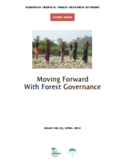Moving Forward with Forest Governance
-----------------
 It is widely acknowledged that improving forest governance is an important prerequisite for sustainable forest management and reducing deforestation and forest degradation. Making governance work better for people and forests is not an easy task. Divergent interests, imbalanced power relations and unequal access to information, decision-making, resources and benefits all contribute to this challenge.
It is widely acknowledged that improving forest governance is an important prerequisite for sustainable forest management and reducing deforestation and forest degradation. Making governance work better for people and forests is not an easy task. Divergent interests, imbalanced power relations and unequal access to information, decision-making, resources and benefits all contribute to this challenge.
The 29 articles in this issue of ETFRN News showcase a rich diversity of examples of how forest governance has been addressed in various settings. The issue brings together experiences from a wide range of forest governance reform initiatives. Some relate to new lessons from well-established approaches to forest governance reform, such as community forestry; others relate to more recently developed initiatives, such as FLEGT. The articles show that international instruments — such as Voluntary Partnership Agreements, forest certification and more recently, REDD+ — are important drivers to address governance in the forest sector.
Experiences described in the articles demonstrate that forest governance challenges do not have “one-size-fits-all” solutions. They also show that regardless of the entry point to initiate forest governance reform, there is always a set of underlying inter-related governance issues. Therefore, an integrated process approach is essential to successfully address forest governance reform. The participatory processes of “good” forest governance create the capacity for continuous learning and enhance the ability to adapt to lessons learned. The articles reveal that transparency, communication and access to information, and multi-stakeholder engagement in deliberative processes, particularly the meaningful participation of disadvantaged groups, are essential ingredients in moving forward with forest governance.
ETFRN News No. 53, produced by Tropenbos International, has been made possible by the financial assistance of the European Union, Deutsche Gesellschaft für Internationale Zusammenarbeit (GIZ) GmbH on behalf of the German Ministry for Economic Cooperation and Development (BMZ), the European Forest Institute’s EU FLEGT Facility, the Federal Office for the Environment (FOEN), Switzerland, and the Government of the Netherlands.
---------------

